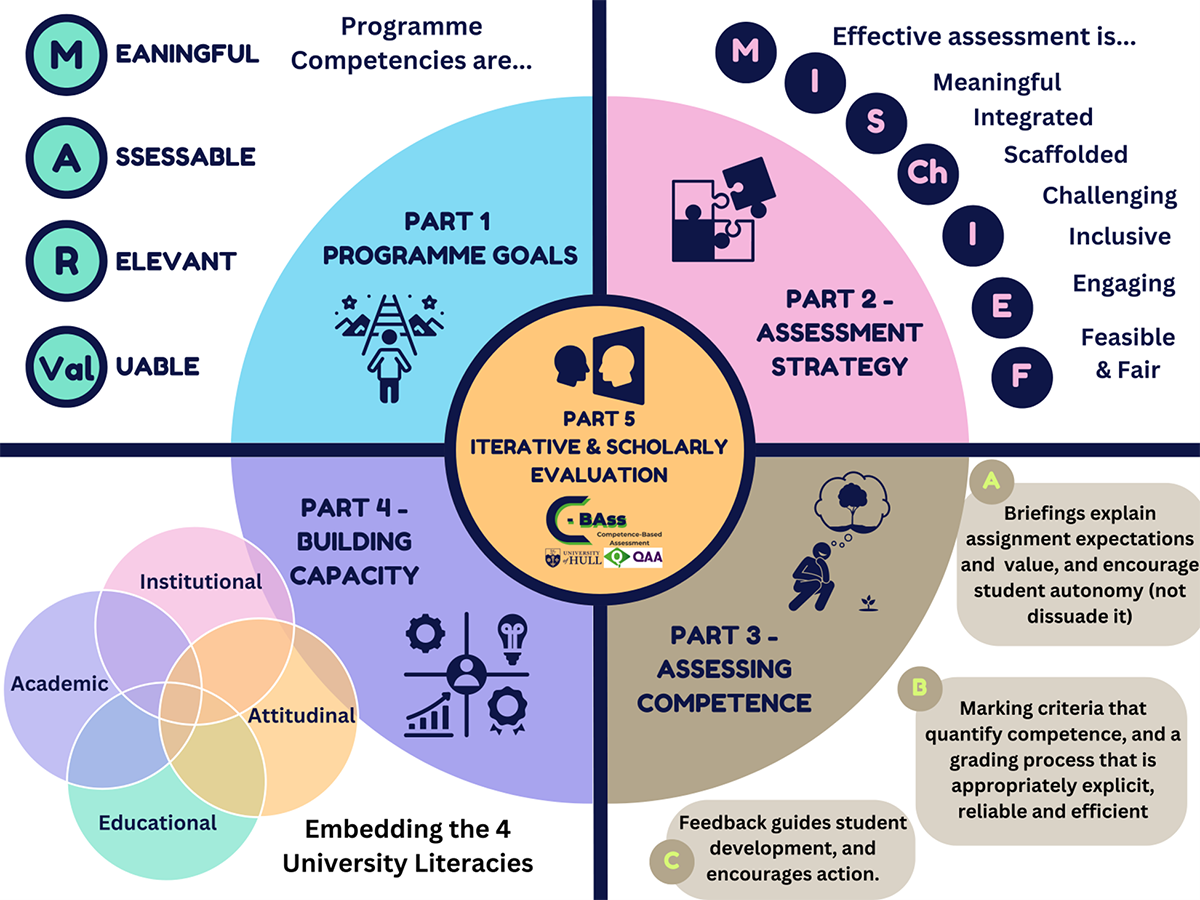7 October 2024
Introduction to the C-BAss framework

Authors
Dr Andrew Holmes
University of Hull
Dr Dom Henri
University of Hull
C-BAss is a structured framework designed for use by programme teams to facilitate the design and implementation of an effective and efficient competence-based undergraduate or postgraduate degree programme.
Competence-based assessment fundamentally involves a change from assessing purely/primarily disciplinary-based knowledge, understanding and skills to assessing what a student is competent in. It places emphasis on what students can do, rather than what they know.
Why is C-BAss needed?
The adoption of competence-based assessment in HE has revealed the presence of a phenomenon that we have called 'constructive dis-alignment'. This is where programme learning outcomes/competencies are not clearly developed by the teaching strategy and not clearly evidenced by the assessment strategy (and may sometimes actually work against each other). This can often lead to confusion amongst both staff and students.
We believe that assessing competence requires a fundamental shift in how higher education curricula are designed. The ‘traditional model’ of curriculum design is typically, at its very simplest, one of:
- Identify programme and module learning outcomes
- Identify content to be taught
- Identify which module will teach what content
- Design and develop teaching materials [and identify teaching strategy]
- Think about how this can be assessed
The assessment is quite often the last thing to be considered, or is only considered in any real depth, after everything else. And sometimes it’s only mid-way through or towards the end of module delivery that any issues with the assessment being ‘fit for purpose’ are identified.
The C-BAss framework fundamentally changes this process and places priority on thinking about, at the programme design stage, how competency will be assessed – before content is considered and before a teaching strategy is developed. It flips curriculum design so that the assessment strategy and module assessments are clearly designed to facilitate student achievement of the final year programme competences. This approach allows the design and development of a programme that is constructively aligned to do this.
The C-BAss model of curriculum development, a five-stage process, at its simplest is:
- Identify and clearly articulate programme competencies.
- Identify how these will be assessed both at the end of the programme, and throughout it i.e. constructively align the programme assessment process with the programme competencies. Clearly identify how, when and where each competence will be assessed within the programme.
- Identify a teaching strategy[ies] that will best facilitate every students’ achievement of the programme competencies. i.e. constructively align the teaching and learning with the assessment process.
- Design and develop teaching/learning materials that, as well as disciplinary knowledge and skills, include the development of student literacies, including assessment literacy.
- View curriculum development as a continuous and iterative process of continuous improvement, and not a process where a ‘perfect’ programme is designed and then delivered.

Each of the C-BAss framework’s stages, summarised in the above infographic, is designed to be used collaboratively by a programme team so that they may develop an effective programme of competence-based education.
For this Collaborative Enhancement Project, the initial three stages (part 1 programme goals, part 2 assessment strategy, and part 3 assessing competence) are supported by face-to-face workshops delivered by University of Hull staff, that focus on structured discussion and hands-on exercises. These encourage staff to consider the whole programme and how several important areas can be addressed, such as: the hidden curriculum, inclusive education, de-colonising the curriculum, efficient and authentic assessment, and how, when and where students’ assessment literacy and competencies are developed.
Progress to date
We have been working both at Hull and with our five project-partner institutions to run workshops, gather data and identify case studies about how the framework can be used to improve the curriculum.
Over this series of blogs, we will explain and unpack each of the different C-BAss stages. We’ll provide you with insights, explanations, and hopefully, some thought-provoking questions.
Here is this month’s blog question for you to consider:
Do you think that the programmes you teach on show signs of ‘constructive dis-alignment’?
For example, have you ever been asked to teach an existing module and found that, from your perspective, the assessment didn’t really ‘fit’ in terms of actually assessing what it was supposed to assess?

